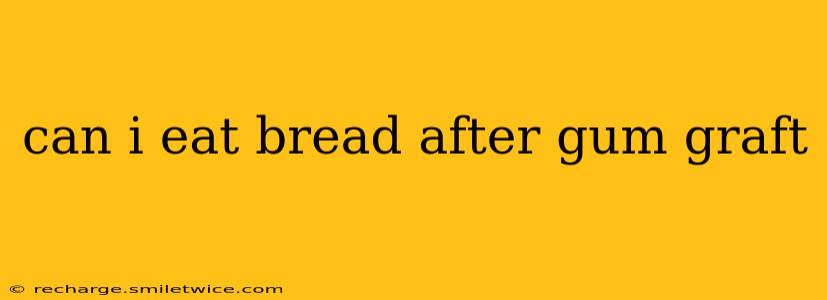Can I Eat Bread After a Gum Graft? A Guide to Post-Operative Diet
Having a gum graft is a significant oral surgery, and proper post-operative care is crucial for successful healing. One of the most common questions patients ask is about diet, specifically, "Can I eat bread after a gum graft?" The answer, as with most things concerning post-surgical recovery, is nuanced. It depends on the type of bread, the healing stage, and your surgeon's specific instructions.
What Can I Eat Right After a Gum Graft?
Immediately following a gum graft, your mouth will likely be numb and sensitive. Soft, cool foods are best. Think pureed soups, applesauce, yogurt, and smoothies. Avoid anything that requires chewing or could irritate the graft site. The goal is to minimize any trauma to the healing tissue.
Can I Eat Bread After a Gum Graft? The Sensitivity Factor
The answer to whether you can eat bread is tied to the texture and your level of comfort. Very soft bread, like a well-cooked baguette or extremely soft white bread, might be tolerable a few days post-surgery, but only if you can eat it without much chewing. Hard crusts, crunchy bread, or anything that requires vigorous chewing is strictly off-limits initially. Even softer breads might cause discomfort, and you should prioritize your comfort above all else.
What Kinds of Bread Are Okay (Eventually)?
As your mouth heals, you can gradually introduce slightly firmer breads. However, even then, pay attention to your body's signals. If chewing causes pain or discomfort, switch back to softer options. Remember, complete healing takes time.
What about Bread with Seeds or Grains?
Bread with seeds, nuts, or grains should be avoided in the initial weeks of recovery. These can easily get lodged in the graft site, potentially leading to infection or complications. Stick to plain, smooth breads until fully healed.
When Can I Return to a Normal Diet?
This varies from patient to patient, depending on the extent of the surgery and individual healing rates. Typically, your dentist or periodontist will provide specific dietary guidelines during your post-operative appointments. Follow their advice carefully. A return to a completely normal diet may take several weeks.
What Should I Avoid After a Gum Graft?
Besides hard and crunchy breads, avoid these foods:
- Spicy foods: These can irritate the sensitive gum tissue.
- Acidic foods: Citrus fruits, tomatoes, and vinegar can also cause irritation.
- Alcohol: Alcohol can interfere with healing and increase the risk of infection.
- Hot foods and drinks: These can increase swelling and discomfort.
How Can I Minimize Discomfort While Eating?
- Eat slowly and deliberately: Chew gently and thoroughly.
- Take small bites: This helps minimize strain on the graft site.
- Avoid straws: The sucking motion can dislodge the graft.
- Stay hydrated: Drinking plenty of water aids in healing.
What if I Experience Complications?
If you experience severe pain, excessive bleeding, or signs of infection (increased swelling, redness, pus), contact your dentist or periodontist immediately.
Remember, your comfort and the successful healing of your gum graft are paramount. While the allure of a warm slice of bread might be tempting, prioritizing your oral health is essential. Always follow your dentist's instructions, and don't hesitate to contact them with any questions or concerns.
